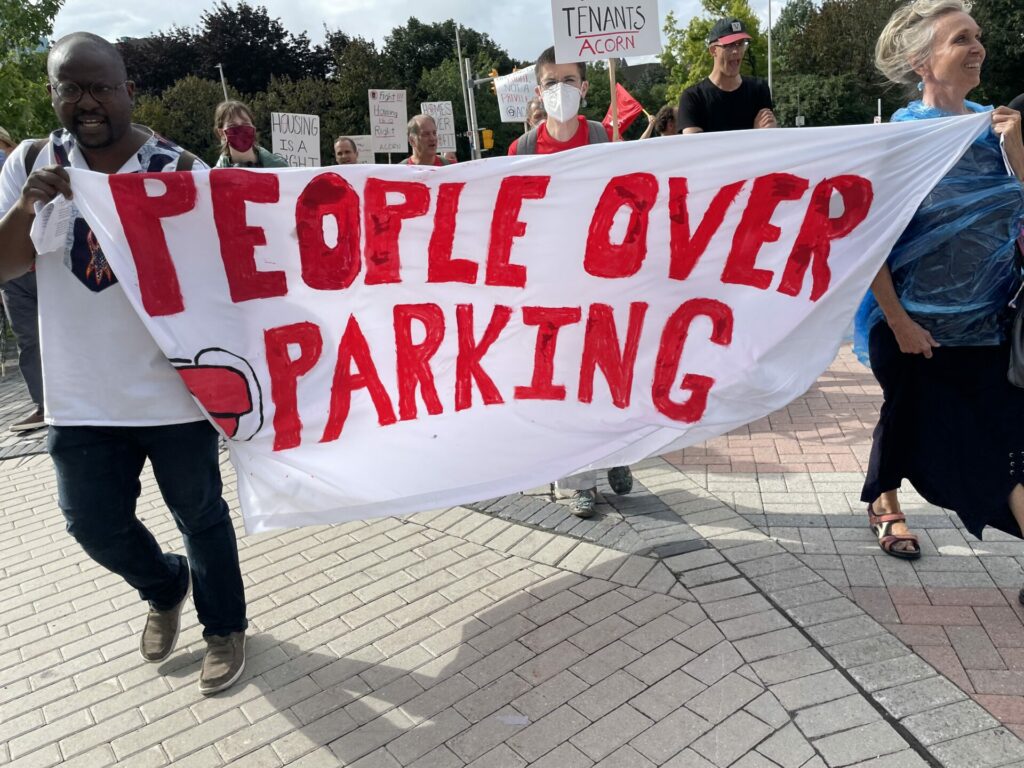Op-ed Ottawa Citizen – Njeukam: Allow cities like Ottawa to save existing affordable housing
Posted May 23, 2023
Ottawa was the first city in the country to declare a housing and homelessness emergency back in 2020, but the housing crisis is only getting worse, and low- and moderate-income tenants are bearing the brunt of this crisis.
The Ontario government claims to offer a solution by aiming to build 1.5 million homes in the next 10 years, the key feature of Bill 23, the More Homes, Built Faster Act, which was rammed through the legislature in November 2022. Recently, to deliver on this objective, the government introduced Bill 97, the Helping Homebuyers, Protecting Tenants Act 2023.
While there is a lot in this bill that will impact tenants, a specific focus is rental replacement bylaws, which are a critical tool to protect existing affordable housing, by requiring developers to build replacement units and offer them to tenants at the same rent post-redevelopment, thereby protecting affordable housing and preventing homelessness. The government is seeking feedback to develop a standardized framework for municipal rental replacement bylaws.
“Demovictions” — displacing a tenant through the demolition of the building in which they are living — are increasingly being used as a tactic to evict long-term tenants. The provincial protections for tenants in case of demolitions are extremely weak. Moreover, a landlord has a massive financial incentive to evict a long-term tenant given that the rent can be increased by any amount once the previous tenancy is terminated. A study by the Ottawa ACORN group concluded that current applications might lead to demovictions impacting 5,500 tenants. The housing units that are at most risk for demolition are the ones built 50 years ago. These purpose-built rentals have remained relatively affordable and offer security of tenure.
Currently, Toronto and Mississauga have rental replacement bylaws. In Toronto alone, since the start of the city’s rental replacement policy framework, between 4,000 and 5,000 private market rental units have been secured. Moreover, as per policy analyst Melissa Goldstein’s submission on Bill 23, in the first seven months of 2022 Toronto approved 28 applications for redevelopment. Due to the city’s regulations, these 28 development projects will not only preserve 907 affordable housing units but also contribute an additional 10,345 new market-rate housing units.
Moreover, it would be nearly impossible for the province to build all the rental housing required to match the need. As per Ottawa urban planner Steve Pomeroy’s estimates, each year in Ontario, 20,000 existing affordable units are lost. In Ottawa, for every one unit built, seven are lost. The City of Ottawa’s Rental Market Analysis 2019 report shows that in the last decade, less than three per cent of all developments were affordable housing units. Moreover, as ACORN’s report shows, these demolitions will accelerate the homelessness crisis. Given the current rent prices, tenants who have been in rent-controlled units for years will have nowhere to go.
Ottawa ACORN has been fighting demovictions since 2015 in Herongate. After public campaigns, ACORN successfully convinced the city council in June 2022 to explore the feasibility of a rental replacement bylaw and an anti-displacement policy in Ottawa. But the city hasn’t taken any step since in light of these new provincial legislative developments.
I moved to 142 Nepean St. in 2020 to save transport costs. One year after moving in, we learned that a developer wanted to tear it down for a parking garage. ACORN won $15,000 for the tenants, replacement units nearby at the same rent for five years and the right to return to the new “affordable” units in the new development. But although these units are defined as below market rent, they will not, in practice, be affordable to many.
What we need is a strong rental replacement bylaw that protects the existing affordable units, provides tenants temporary accommodations and allows tenants to come back at the same rent after the redevelopment. Standardization should not mean taking away cities’ ability to have strong bylaws that are protecting affordable homes from becoming unaffordable.
***
Authored by Lionel Njeukam for Ottawa Citizen
Lionel is an Ottawa ACORN tenant leader affected by demovictions. Ottawa ACORN (Association of Community Organizations for Reform Now) is a community union of low- and moderate-income people.)

